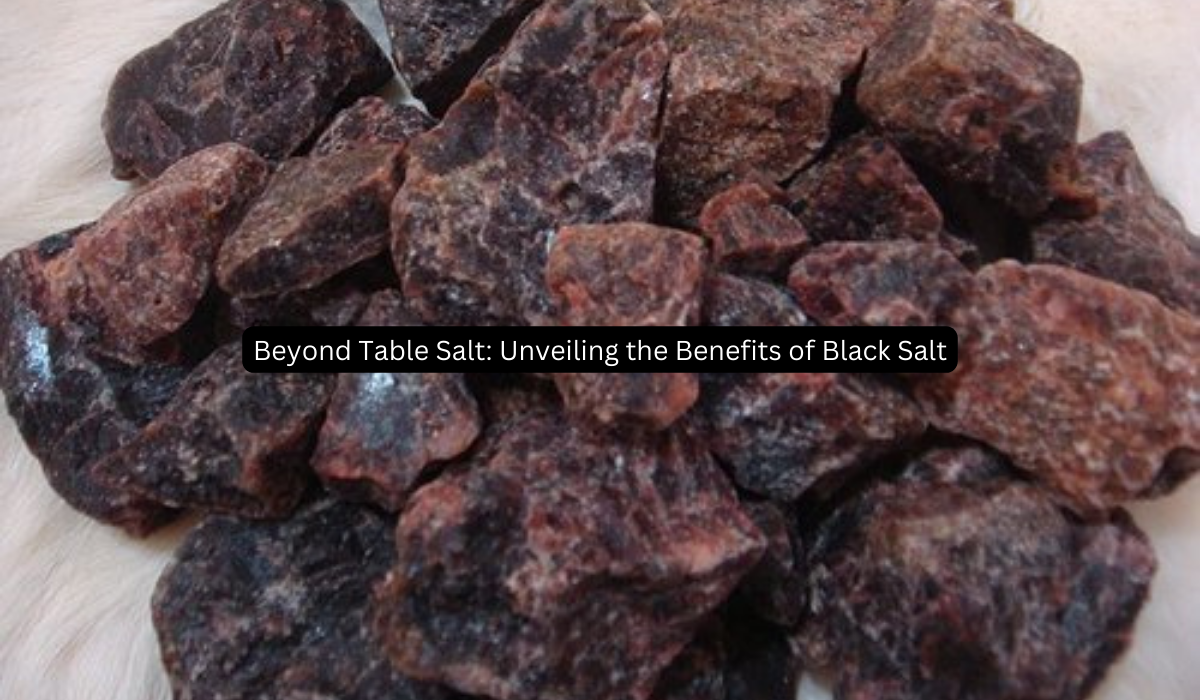We all know the familiar white crystals that grace our kitchen tables – table salt. But have you heard of its lesser-known cousin, black salt? Imagine venturing beyond the ordinary white salt shaker and discovering a world of flavor and potential health benefits with black salt. This unique condiment, also known as Kala Namak, boasts a volcanic origin and a distinctive flavor profile that can elevate your cooking and potentially offer some health advantages. Let’s delve into the world of black salt and explore its potential benefits.
Volcanic Origins and a Distinctive Flavor
Black salt isn’t just table salt dyed black for dramatic effect. Unlike its white counterpart, black salt is formed through the natural evaporation of ancient sea water around volcanic regions. Think of it as a mineral concentrate, drawing its unique properties from the volcanic activity and the surrounding environment. This process imbues black salt with its characteristic dark color, a strong sulfurous aroma (often described as resembling hard-boiled eggs), and a slightly salty taste with a hint of minerality.
The flavor profile of black salt makes it a popular ingredient in South Asian and Himalayan cuisine. It adds a unique depth of flavor to savory dishes like curries, chutneys, and lentil soups. Imagine it as a flavor bomb waiting to explode in your taste buds, adding an exciting twist to your culinary creations.
Beyond Flavor: Potential Health Benefits of Black Salt
While more research is needed to fully understand the health benefits of black salt, some potential advantages are worth exploring:
- Improved Digestion: Black salt is believed to stimulate digestive juices and enzymes, potentially aiding digestion and reducing bloating. Think of it as a gentle nudge for your digestive system, helping things move smoothly.
- Reduced Acidity: Some studies suggest that black salt might help regulate stomach acid levels, offering relief from heartburn and acid reflux. Imagine it as a soothing balm for your stomach, calming discomfort and irritation.
- Lower Blood Pressure: Black salt may have a mild blood pressure-lowering effect due to its lower sodium content compared to regular table salt. This is especially beneficial for individuals watching their sodium intake. It’s important to note that consulting a healthcare professional is crucial before using black salt as a primary blood pressure management tool.
- Potential Detoxification: Black salt is sometimes touted for its detoxifying properties. However, the body has its own efficient detoxification system, and the specific role of black salt in detoxification remains unclear.
It’s important to remember that these are potential benefits, and further scientific research is required to confirm their effectiveness. Black salt shouldn’t be considered a cure-all for any health condition.
Black Salt vs. Table Salt: Making the Switch
Black salt isn’t meant to completely replace table salt in your kitchen. Think of it as a flavor enhancer and a potential health booster, used strategically to add a unique touch to your dishes. Here’s how you can incorporate black salt into your cooking:
- Start Small: Due to its stronger flavor profile, begin by using a smaller amount of black salt compared to the table salt you’d typically use.
- Focus on Flavor Enhancement: Use black salt in dishes where its unique flavor can shine, like curries, lentil soups, or chutneys.
- A Finishing Touch: Sprinkle a small amount of black salt on top of your dish before serving for an extra burst of flavor and a beautiful presentation.
Remember, black salt tends to be higher in certain minerals than table salt, so moderation is key. It’s always best to consult a healthcare professional before making significant changes to your dietary salt intake.
Conclusion
Black salt, with its volcanic origins and distinctive flavor profile, offers more than just a unique culinary experience. It holds potential health benefits with its digestive-supporting properties and potential role in regulating blood pressure and acidity. While further research is needed to solidify its health claims, black salt can be a valuable addition to your spice cabinet, adding a touch of flavor and potentially promoting overall well-being. So, next time you’re looking to elevate your dish or explore new flavors, consider reaching for the black salt shaker and discover its hidden potential.
Frequently Asked Questions
1. Does black salt contain iodine like table salt?
No, unlike table salt, black salt typically doesn’t contain added iodine. Iodine is a crucial mineral for thyroid health. If you’re switching to black salt, ensure you’re getting enough iodine from other dietary sources like seafood, dairy products, or iodized salt used sparingly.
2. Can black salt help with weight loss?
While black salt might indirectly aid digestion, there’s no scientific evidence to support its role in weight loss. A healthy diet and regular exercise remain the cornerstones of successful weight management.
3. Is black salt safe for everyone to consume?
For most individuals, black salt is safe to consume in moderation. However, if you have any underlying health conditions, especially related to kidney function or are on a strict sodium restriction, consult a healthcare professional before incorporating black salt into your diet.
4. Can I use black salt for medicinal purposes?
Black salt is primarily a culinary ingredient. While some potential health benefits are being explored, it shouldn’t be used as a substitute for medical treatment. Consult a healthcare professional for any health concerns.
5. Does black salt have any side effects?
Black salt is generally safe when consumed in moderate amounts. However, excessive intake could lead to increased thirst, bloating, or even diarrhea due to its higher mineral content compared to table salt.

